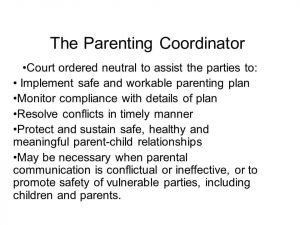Working with high conflict personalities, I have always been open to approaches that can manage difficult issues with HCPs (High Conflict Personalities), without necessarily involving the courts every time there is a dispute, or transgression by a HCP. One way of dealing with difficult personalities in divorce is to have a Parenting Coordinator involved in the case. What is a Parenting Coordinator (PC) ? Essentially, a PC acts as a middleman, referee, and dispute resolver. The PC can make recommendations to a solution for a disputed issue. In other words, the PC can act almost as a magistrate for the judge, and help the Court manage these difficult issues without court involvement. Because the PC acts almost like a magistrate judge, some judges in the Family Courts do not like to appoint PCs, believing that they are essentially usurping the function of the judge. However, for certain cases, it is my opinion that a Parenting Coordinator can be a valuable tool and resource in managing issues that arise with a HCP.
___________________
Parenting Coordination began gaining recognition in the 1990s as a result of presentations and trainings first offered at conferences such as the Association of Family and Conciliation Courts (AFCC) and by experienced Parenting Coordinators. Initially there were variations in role, source and degree of authority, and practice in different jurisdictions, and different titles were used to describe this innovative intervention model, including Special Masters, Co-Parenting Facilitators, or Mediator/Arbitrators. In 2003, AFCC appointed an interdisciplinary task force to develop Guidelines for Parenting Coordination to guide mental health professionals, mediators, and lawyers with respect to training, practice, and ethics (AFCC, 2006).

Court ordered neutral to assist the parties to: Implement safe and workable parenting plan. Monitor compliance with details of plan. Resolve conflicts in timely manner. Protect and sustain safe, healthy and meaningful parent-child relationships. May be necessary when parental communication is conflictual or ineffective, or to promote safety of vulnerable parties, including children and parents.
Parenting Coordination is a non-adversarial dispute resolution process that is court ordered or agreed upon by divorced and separated parents who have an ongoing pattern of high conflict and/or litigation about their children (Coates, Deutsch, Starnes, Sullivan, & Sydlik, 2004; Deutsch, Coates, & Fieldstone, 2008; Kelly, 2002, 2008). The underlying principle of the Parenting Coordination intervention is a continuous focus on children’s best interests by the Parenting Coordinator (PC) in working with high conflict parents and in decision-making. Parenting Coordination is designed to help parents implement and comply with court orders or parenting plans, to make timely decisions in a manner consistent with children’s developmental and psychological needs, to reduce the amount of damaging conflict between caretaking adults to which children are exposed, and to diminish the pattern of unnecessary re-litigation about child related issues. Parenting Coordination is appropriate pre- or post-decree, though it is most widely used as a post-decree model of intervention for parents who have demonstrated an inability to resolve their disputes through other dispute resolution and adversarial processes such as mediation, initial settlement conferences, and custody evaluations. Arbitration is a central component of the practice of Parenting Coordination, where permitted under state law, local rule, or by court order. Recent research provides some preliminary evidence of the benefits of Parenting Coordination for high-conflict families and for the courts (Henry, et al., 2009; Lally & Higuchi, 2008; Scott et al., 2010).
Parenting Coordination is generally not a confidential process. The PCs may be authorized to speak with other professionals involved with the family and the court may require documentation regarding Parenting Coordination interventions and outcomes. PCs do not disclose clients’ records or information except as relevant to the Parenting Coordination process, in emergencies, or as authorized by court order or written agreement of the parties.
 Illinois Divorce Lawyer Blog
Illinois Divorce Lawyer Blog

